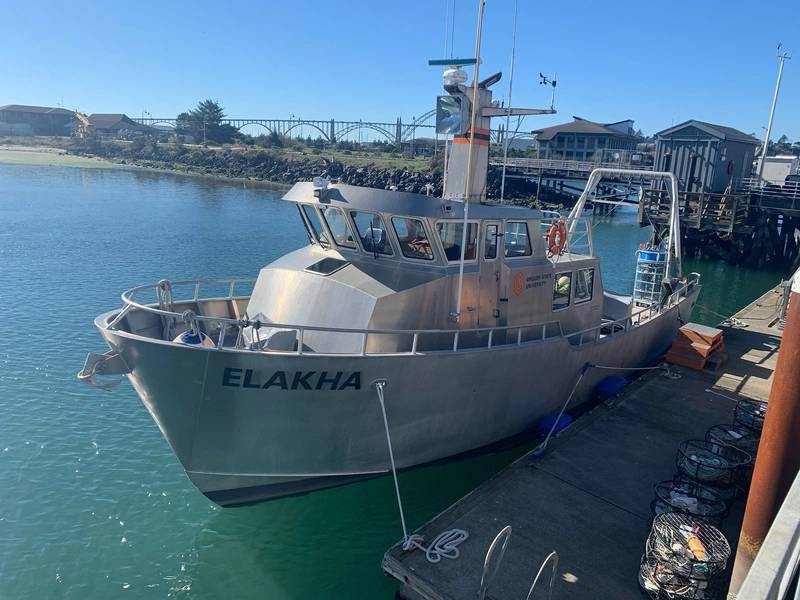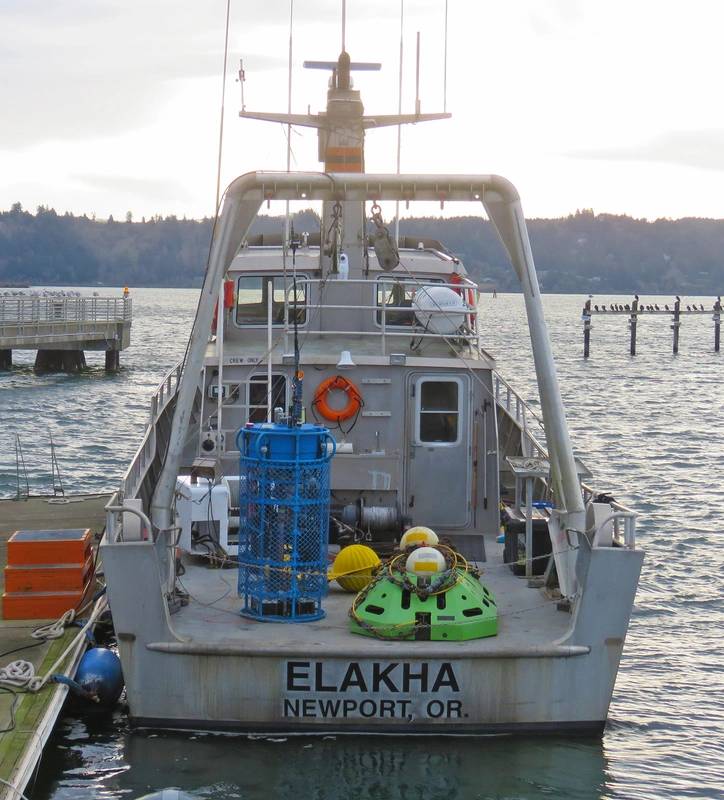Elakha: The Repowering of OSU's Valued Research Vessel
Ocean science is in high demand by scientists studying ocean acidification, wave energy, seabed composition, changing water temperatures, fish populations and dozens of other research projects. The Oregon State University (OSU) has a proud history in the field. The wide variety of research project require a variety of vessels.
One boat that has made large contributions to research is the 54 by 16.5-foot Elakha which was built in 2001 at Rozema Boat Works of Mount Vernon Washington. Showing design influences of a typical forward house west coast style fishing boat, the Elakha’s after deck is set up for retrieving data from the ocean, although some fish research is also possible. The university works with a variety of organization to pursue research.

The boat has enabled marine studies. Work has ranged widely including benthic ecology, oceanography, marine mammal studies, ornithology, climatology, fluid dynamics, marine ecology, and estuary ecology. Some of the most common types of work for the Elakha include dive operations, acoustic studies, glider deployment and recovery, box coring, profiler deployment and recovery, plankton and other tows, crab pot deployment and recovery and CTD casts.
As the boat approached its twentieth year of operation, the team at OSU had to consider the best mid-life upgrade. The existing 600 hp CAT 3176 had given good service and they considered a rebuild. Writing about the selection process, the Elakha’s master, Captain Jeff Lawrence, describes the process very well:
“…As part of this evaluation we contacted Scott Graff at Curry Marine. In just a few short days Scott came up with a great package for our project that checked every box on our needs list. we decided to go with a new tier 3 Cummins QSM 11 610hp engine A ZF360A 2.44:1 marine gear and Glendinning ECS controls.
“On February 28, 2020 the R/V Elakha made her way up the Yaquina river to the Port of Toledo Boat Yard at Toledo Oregon to be hauled out and the re-power begun. After a week’s time the old engine and gears were out, and we started to fit the new equipment to the boat. The process of transitioning from the older Cat to a new Cummins there was plenty of fabrication that had to be done before the new QSM11 engine and the ZF gears could be installed. With the skillful hands of the yard’s mechanics, David Stoker and Ted Mandell, things came together nicely. Among the major changes for which we had to account during our transition from a CAT engine to a Cummins were the motor mount locations and the line-up from the engine to the transmission. These adjustments were supervised and instituted by David Stoker for the most part, with assistance from Captain Jeff Lawrence.

“Almost immediately we faced a serious obstacle, the outbreak of COVID-19 at the start of our planned shipyard time period. Shortly after delivering the Elakha to the Toledo shipyard, the COVID-19 pandemic was in full bloom compounding the health hazard with federal and state reactions and safety guidelines. Logistics were severely hamstrung, personnel/vendors were infinitely more difficult to find and line up, and operations in general came to a trudging crawl. The pandemic added approximately 10 weeks to our estimated timeline for completing the re-power. It is a testament to the determination of Toledo shipyard, Curry marine, and OSU Ship Operations that the project was completed at all. Throughout the developing pandemic, progress did win the day.
“After the new engine and gears were installed, new Racor’s, fuel lines, raw water-cooling systems, muffler and exhaust all went in. In addition to these upgrades, new Glendinning ECS controls were installed as well during this time, as well as significant re-wiring from the engine to the engine brainbox, and up to the controls in the wheelhouse. With a good amount of assistance from Scott Hatfield from the shipyard, the Elakha crew removed all the old wiring for the CAT engine and ran new wiring for the Cummins engine.
“Along with this new wiring, the Elakha received some dash control upgrades as well in the form of a more modern engine monitoring system with a more comprehensive assortment of readouts and information for the main engine. After everything the installations were complete The Elakha happily splashed back into the Yaquina river and we arranged for a test run.
The Curry Marine mechanics, Scout Hockema, Scott Houck and Matt Orr arrived at the yard and we fired up the new engine. As expected, it fired right up and ran smooth. We ran the engine at the dock all day without incident. With a few minor adjustments we were ready for sea trials. Our plan was to run down to Newport and back the next day. Sea trials went remarkably well, the vessel performance was excellent and significantly surpassed our expectations. With a newly repowered vessel, significant upgrades and COVID-19 mitigation procedures firmly in place, we were ready to go back to work just in time to kick off the busy summer season.
“For the past six months we have stayed busy even within the mitigating parameters of the ongoing pandemic, and the new restrictive operational practices we have developed to keep all users and crew safe. The new engine and gears are running smother, quitter, cleaner and more fuel efficient than ever before. The new Cummins engine provides our operations with more available power and speed, while also increasing fuel economy, which is certainly not a common combination. It’s a real comfort being offshore in adverse conditions to have the reliability and power that you know you need to get home safely.
“Captain Lawrence, and our whole team are grateful to Oregon State University and specifically our College of Earth, Ocean and Atmospheric Sciences for their continued support and financial commitment to the Elakha and her mission of safe science at sea. We are indebted to all of the scientists who advocate for our vessel and our mission. Finally, we sincerely appreciate Scott Graff and his team at Curry Marine for their hours, experience and efforts that they put into this major project and also to Toledo Boat Yard for the great work on the install.”
